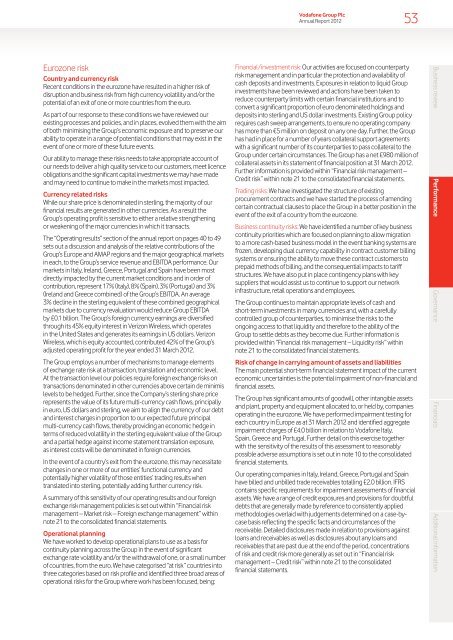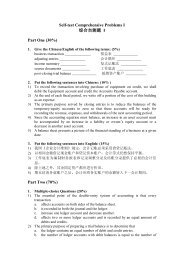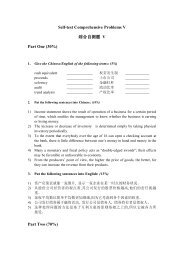Vodafone Group Plc Annual Report for the year ended 31 March 2012
Vodafone Group Plc Annual Report for the year ended 31 March 2012
Vodafone Group Plc Annual Report for the year ended 31 March 2012
Create successful ePaper yourself
Turn your PDF publications into a flip-book with our unique Google optimized e-Paper software.
<strong>Vodafone</strong> <strong>Group</strong> <strong>Plc</strong><br />
<strong>Annual</strong> <strong>Report</strong> <strong>2012</strong><br />
53<br />
Eurozone risk<br />
Country and currency risk<br />
Recent conditions in <strong>the</strong> eurozone have resulted in a higher risk of<br />
disruption and business risk from high currency volatility and/or <strong>the</strong><br />
potential of an exit of one or more countries from <strong>the</strong> euro.<br />
As part of our response to <strong>the</strong>se conditions we have reviewed our<br />
existing processes and policies, and in places, evolved <strong>the</strong>m with <strong>the</strong> aim<br />
of both minimising <strong>the</strong> <strong>Group</strong>’s economic exposure and to preserve our<br />
ability to operate in a range of potential conditions that may exist in <strong>the</strong><br />
event of one or more of <strong>the</strong>se future events.<br />
Our ability to manage <strong>the</strong>se risks needs to take appropriate account of<br />
our needs to deliver a high quality service to our customers, meet licence<br />
obligations and <strong>the</strong> significant capital investments we may have made<br />
and may need to continue to make in <strong>the</strong> markets most impacted.<br />
Currency related risks<br />
While our share price is denominated in sterling, <strong>the</strong> majority of our<br />
financial results are generated in o<strong>the</strong>r currencies. As a result <strong>the</strong><br />
<strong>Group</strong>’s operating profit is sensitive to ei<strong>the</strong>r a relative streng<strong>the</strong>ning<br />
or weakening of <strong>the</strong> major currencies in which it transacts.<br />
The “Operating results” section of <strong>the</strong> annual report on pages 40 to 49<br />
sets out a discussion and analysis of <strong>the</strong> relative contributions of <strong>the</strong><br />
<strong>Group</strong>’s Europe and AMAP regions and <strong>the</strong> major geographical markets<br />
in each, to <strong>the</strong> <strong>Group</strong>’s service revenue and EBITDA per<strong>for</strong>mance. Our<br />
markets in Italy, Ireland, Greece, Portugal and Spain have been most<br />
directly impacted by <strong>the</strong> current market conditions and in order of<br />
contribution, represent 17% (Italy), 8% (Spain), 3% (Portugal) and 3%<br />
(Ireland and Greece combined) of <strong>the</strong> <strong>Group</strong>’s EBITDA. An average<br />
3% decline in <strong>the</strong> sterling equivalent of <strong>the</strong>se combined geographical<br />
markets due to currency revaluation would reduce <strong>Group</strong> EBITDA<br />
by £0.1 billion. The <strong>Group</strong>’s <strong>for</strong>eign currency earnings are diversified<br />
through its 45% equity interest in Verizon Wireless, which operates<br />
in <strong>the</strong> United States and generates its earnings in US dollars. Verizon<br />
Wireless, which is equity accounted, contributed 42% of <strong>the</strong> <strong>Group</strong>’s<br />
adjusted operating profit <strong>for</strong> <strong>the</strong> <strong>year</strong> <strong>ended</strong> <strong>31</strong> <strong>March</strong> <strong>2012</strong>.<br />
The <strong>Group</strong> employs a number of mechanisms to manage elements<br />
of exchange rate risk at a transaction, translation and economic level.<br />
At <strong>the</strong> transaction level our policies require <strong>for</strong>eign exchange risks on<br />
transactions denominated in o<strong>the</strong>r currencies above certain de minimis<br />
levels to be hedged. Fur<strong>the</strong>r, since <strong>the</strong> Company’s sterling share price<br />
represents <strong>the</strong> value of its future multi-currency cash flows, principally<br />
in euro, US dollars and sterling, we aim to align <strong>the</strong> currency of our debt<br />
and interest charges in proportion to our expected future principal<br />
multi-currency cash flows, <strong>the</strong>reby providing an economic hedge in<br />
terms of reduced volatility in <strong>the</strong> sterling equivalent value of <strong>the</strong> <strong>Group</strong><br />
and a partial hedge against income statement translation exposure,<br />
as interest costs will be denominated in <strong>for</strong>eign currencies.<br />
In <strong>the</strong> event of a country’s exit from <strong>the</strong> eurozone, this may necessitate<br />
changes in one or more of our entities’ functional currency and<br />
potentially higher volatility of those entities’ trading results when<br />
translated into sterling, potentially adding fur<strong>the</strong>r currency risk.<br />
A summary of this sensitivity of our operating results and our <strong>for</strong>eign<br />
exchange risk management policies is set out within “Financial risk<br />
management – Market risk – Foreign exchange management” within<br />
note 21 to <strong>the</strong> consolidated financial statements.<br />
Operational planning<br />
We have worked to develop operational plans to use as a basis <strong>for</strong><br />
continuity planning across <strong>the</strong> <strong>Group</strong> in <strong>the</strong> event of significant<br />
exchange rate volatility and/or <strong>the</strong> withdrawal of one, or a small number<br />
of countries, from <strong>the</strong> euro. We have categorised “at risk” countries into<br />
three categories based on risk profile and identified three broad areas of<br />
operational risks <strong>for</strong> <strong>the</strong> <strong>Group</strong> where work has been focused, being:<br />
Financial/investment risk: Our activities are focused on counterparty<br />
risk management and in particular <strong>the</strong> protection and availability of<br />
cash deposits and investments. Exposures in relation to liquid <strong>Group</strong><br />
investments have been reviewed and actions have been taken to<br />
reduce counterparty limits with certain financial institutions and to<br />
convert a significant proportion of euro denominated holdings and<br />
deposits into sterling and US dollar investments. Existing <strong>Group</strong> policy<br />
requires cash sweep arrangements, to ensure no operating company<br />
has more than €5 million on deposit on any one day. Fur<strong>the</strong>r, <strong>the</strong> <strong>Group</strong><br />
has had in place <strong>for</strong> a number of <strong>year</strong>s collateral support agreements<br />
with a significant number of its counterparties to pass collateral to <strong>the</strong><br />
<strong>Group</strong> under certain circumstances. The <strong>Group</strong> has a net £980 million of<br />
collateral assets in its statement of financial position at <strong>31</strong> <strong>March</strong> <strong>2012</strong>.<br />
Fur<strong>the</strong>r in<strong>for</strong>mation is provided within “Financial risk management –<br />
Credit risk” within note 21 to <strong>the</strong> consolidated financial statements.<br />
Trading risks: We have investigated <strong>the</strong> structure of existing<br />
procurement contracts and we have started <strong>the</strong> process of amending<br />
certain contractual clauses to place <strong>the</strong> <strong>Group</strong> in a better position in <strong>the</strong><br />
event of <strong>the</strong> exit of a country from <strong>the</strong> eurozone.<br />
Business continuity risks: We have identified a number of key business<br />
continuity priorities which are focused on planning to allow migration<br />
to a more cash-based business model in <strong>the</strong> event banking systems are<br />
frozen, developing dual currency capability in contract customer billing<br />
systems or ensuring <strong>the</strong> ability to move <strong>the</strong>se contract customers to<br />
prepaid methods of billing, and <strong>the</strong> consequential impacts to tariff<br />
structures. We have also put in place contingency plans with key<br />
suppliers that would assist us to continue to support our network<br />
infrastructure, retail operations and employees.<br />
The <strong>Group</strong> continues to maintain appropriate levels of cash and<br />
short-term investments in many currencies and, with a carefully<br />
controlled group of counterparties, to minimise <strong>the</strong> risks to <strong>the</strong><br />
ongoing access to that liquidity and <strong>the</strong>re<strong>for</strong>e to <strong>the</strong> ability of <strong>the</strong><br />
<strong>Group</strong> to settle debts as <strong>the</strong>y become due. Fur<strong>the</strong>r in<strong>for</strong>mation is<br />
provided within “Financial risk management – Liquidity risk” within<br />
note 21 to <strong>the</strong> consolidated financial statements.<br />
Risk of change in carrying amount of assets and liabilities<br />
The main potential short-term financial statement impact of <strong>the</strong> current<br />
economic uncertainties is <strong>the</strong> potential impairment of non-financial and<br />
financial assets.<br />
The <strong>Group</strong> has significant amounts of goodwill, o<strong>the</strong>r intangible assets<br />
and plant, property and equipment allocated to, or held by, companies<br />
operating in <strong>the</strong> eurozone. We have per<strong>for</strong>med impairment testing <strong>for</strong><br />
each country in Europe as at <strong>31</strong> <strong>March</strong> <strong>2012</strong> and identified aggregate<br />
impairment charges of £4.0 billion in relation to <strong>Vodafone</strong> Italy,<br />
Spain, Greece and Portugal. Fur<strong>the</strong>r detail on this exercise toge<strong>the</strong>r<br />
with <strong>the</strong> sensitivity of <strong>the</strong> results of this assessment to reasonably<br />
possible adverse assumptions is set out in note 10 to <strong>the</strong> consolidated<br />
financial statements.<br />
Our operating companies in Italy, Ireland, Greece, Portugal and Spain<br />
have billed and unbilled trade receivables totalling £2.0 billion. IFRS<br />
contains specific requirements <strong>for</strong> impairment assessments of financial<br />
assets. We have a range of credit exposures and provisions <strong>for</strong> doubtful<br />
debts that are generally made by reference to consistently applied<br />
methodologies overlaid with judgements determined on a case-bycase<br />
basis reflecting <strong>the</strong> specific facts and circumstances of <strong>the</strong><br />
receivable. Detailed disclosures made in relation to provisions against<br />
loans and receivables as well as disclosures about any loans and<br />
receivables that are past due at <strong>the</strong> end of <strong>the</strong> period, concentrations<br />
of risk and credit risk more generally as set out in “Financial risk<br />
management – Credit risk” within note 21 to <strong>the</strong> consolidated<br />
financial statements.<br />
Business review Per<strong>for</strong>mance Governance Financials Additional in<strong>for</strong>mation






